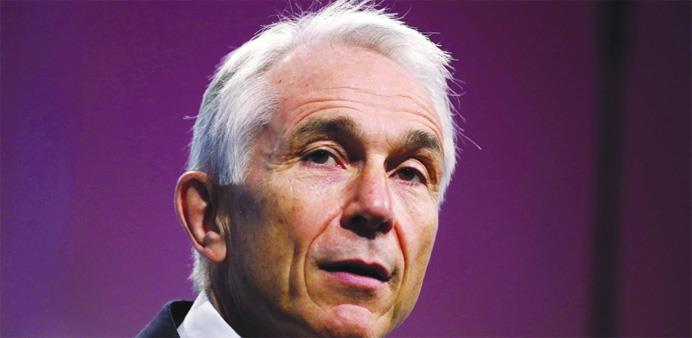
403
Sorry!!
Error! We're sorry, but the page you were
looking for doesn't exist.
Air traffic management a 'pressing concern' in the Mideast: IATA chief
(MENAFN- Gulf Times) Air Traffic Management (ATM) is an issue of "pressing concern" in the Middle East, according to IATA director-general Tony Tyler.
"Capacity has not kept pace with the growth in demand, which is leading to significant delays," he said at the AACO Annual General Meeting in Jeddah yesterday.
"I understand that Emirates alone has suffered 1,740,000 minutes of ATM-related departure delay for the year-to-date. There are 525,600 minutes in a year. So, that is equal to having three of their aircraft completely unproductive for an entire year. Moreover, this leads to significant inefficiency to hub operations, which we all know need high levels of on-time performance.
"Other major carriers in the region are similarly suffering. The region grew by 13% last year and that trend is set to continue. Without action, this situation will get much worse. Cooperation between countries to achieve change is paramount," Tyler said.
Twenty years ago, the Middle East accounted for about 3% of global revenue passenger miles (RPKs). Today its share is almost 10% and rising. The region has become an aviation powerhouse, helping to drive economic and social development. The Gulf has become an even stronger trading hub of the world, connecting East and West, North and South.
He urged the full commitment of various countries to the Middle East Enhancement Programme (MEAP).
This, he said, would facilitate regional cooperation in order to overcome fragmented airspace structures end ensure efficient infrastructure. "Nobody is challenging sovereignty."
"We just need countries to work together so that aircraft can get from A to B as efficiently as possible. That's in everybody's interest!"
Tyler said the second element was more flexible use of airspace between military and civilian operations.
"Again, nobody is challenging sovereignty or the right of the military to airspace. But prioritising the current route network to take into account real traffic flows and looking at what is working in other regions on flexible use of airspace and dynamic route management could pay big dividends - particularly in the Gulf.
"Continued progress in all these areas is required in the short- and long-term. But If I consider what concrete achievements would be most useful by the middle of 2018, it would be for the airspace over the Saudi Empty Quarter to be opened up, and for traffic flow in the Muscat Flight Information Region (Muscat FIR) to improve. I would also like to see air navigation service providers establish a mechanism to measure ATM system performance against user expectations," the IATA director-general said.
"Capacity has not kept pace with the growth in demand, which is leading to significant delays," he said at the AACO Annual General Meeting in Jeddah yesterday.
"I understand that Emirates alone has suffered 1,740,000 minutes of ATM-related departure delay for the year-to-date. There are 525,600 minutes in a year. So, that is equal to having three of their aircraft completely unproductive for an entire year. Moreover, this leads to significant inefficiency to hub operations, which we all know need high levels of on-time performance.
"Other major carriers in the region are similarly suffering. The region grew by 13% last year and that trend is set to continue. Without action, this situation will get much worse. Cooperation between countries to achieve change is paramount," Tyler said.
Twenty years ago, the Middle East accounted for about 3% of global revenue passenger miles (RPKs). Today its share is almost 10% and rising. The region has become an aviation powerhouse, helping to drive economic and social development. The Gulf has become an even stronger trading hub of the world, connecting East and West, North and South.
He urged the full commitment of various countries to the Middle East Enhancement Programme (MEAP).
This, he said, would facilitate regional cooperation in order to overcome fragmented airspace structures end ensure efficient infrastructure. "Nobody is challenging sovereignty."
"We just need countries to work together so that aircraft can get from A to B as efficiently as possible. That's in everybody's interest!"
Tyler said the second element was more flexible use of airspace between military and civilian operations.
"Again, nobody is challenging sovereignty or the right of the military to airspace. But prioritising the current route network to take into account real traffic flows and looking at what is working in other regions on flexible use of airspace and dynamic route management could pay big dividends - particularly in the Gulf.
"Continued progress in all these areas is required in the short- and long-term. But If I consider what concrete achievements would be most useful by the middle of 2018, it would be for the airspace over the Saudi Empty Quarter to be opened up, and for traffic flow in the Muscat Flight Information Region (Muscat FIR) to improve. I would also like to see air navigation service providers establish a mechanism to measure ATM system performance against user expectations," the IATA director-general said.

Legal Disclaimer:
MENAFN provides the information “as is” without warranty of any kind. We do not accept any responsibility or liability for the accuracy, content, images, videos, licenses, completeness, legality, or reliability of the information contained in this article. If you have any complaints or copyright issues related to this article, kindly contact the provider above.






















Comments
No comment